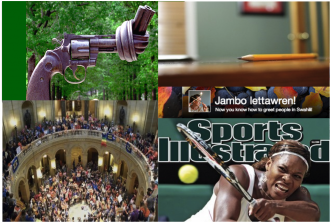 Use Twitter to Refine Your Writing
Use Twitter to Refine Your Writing
As a prematurely old person (that is, I’m technically 33, but I make a suspicious number of references to “those damn kids” and know the difference between e.g. and i.e.), I can be wary of social media. Still, I’ve found one way Twitter is really useful for the writers I advise: forced brevity.
Off the top of my head, I have two approaches to using Twitter to guide writing, and I’d be happy to hear others’ ideas.
- Use Twitter (or just its 140-character limit) to find your lede. That is, what’s the catchy selling point of your article? How would you draw in readers? Trust me, the first sentence of your abstract isn’t going to draw page views (let alone keep eyes on the page once they get there). Think hard, revise, and rewrite your opening line.
- Use Twitter to find your point. If you’re brutal, you really should be able to get an article’s point into a Tweet. What’s the essential core of your article? You have a whole paper to discuss your methods, delve into a thorough lit review, and otherwise prove your legitimacy as an expert on this topic. But you should only need a sentence or two to tell people what the paper is about.
Both of these ideas come back to thinking of your article in terms of how you’d tell your mom or kid or next door neighbor what you’re writing about this summer. What context would make it as interesting for them as it is for you? And how could you say it across the fence? That’s a lot of rhetorical questions for an editor who doesn’t like them, so trust that I’m being both serious and off-the-cuff here.
Now, we have some catching up to do. Time for the Friday Roundup!
In Case You Missed It:
Because we know not everyone gets to read everything we post (you really should be working TSP into your schedule better, readers!), I want to include a piece each week that deserves a second look. Here’s this week’s:
“American Immigration and Forgetting,” by Stephen Suh. The topic that just won’t get settled, immigration is, again, in the news. Check in with top scholars Yen Le Espiritu, Katherine Fennelly, and Douglas A. Massey for a historical overview and a sociological perspective.
Citings & Sightings:
“What Does an Atheist Look Like?” by Evan Stewart. In which George Yancey looks for what makes an American Atheist.
“Gendered Issues (of Sports Illustrated),” by Andrew Wiebe. In which sociologists don’t find female athletes on newsstands, at least not in the past couple of decades. I hear there’s a Sports Illustrated for Women now, though. Oh, please let it be pink! (Side note: seriously, check out the comments.)
Office Hours:
“G. William Domhoff on Pension Fund Capitalism,” with Rahsaan Mahadeo. In which Domhoff, author of The New CEOs and Who Rules America?, discusses the relationship (or lack thereof) between retirement funding and corporate bottom lines.
Teaching TSP:
“First Day of Class,” by Hollie Nyseth Brehm. In which summer instructors break the ice.
“Racial Stereotypes, Scapegoating, and the Economic Crisis,” by Kia Heise. In which Heise shares a few ways to talk about Catherine Squires new Office Hours podcast with TSP.
A Few from the Community Pages:
- Dispatches from a New Dean. In his first couple of weeks on TSP, Walt has been ramping up for his new role in the admin offices and musing on everything from Star Trek to culturally-appropriate greetings to associate professors as department chairs. He’s also getting ready to move into the dorms. Talk about damn kids. Can’t wait to see those posts!
- Public Criminology. Non-violent felons who’ve done their time can now cast votes in Virginia, and Minnesotans move to let ex-cons make it through the first round of job applications before disclosing their criminal past by “banning the box.”
- Sociological Images and Sociology Lens converge on environmentalism from two very different directions: citizenship and immigration and breast cancer activism.
- Cyborgology. Those cyborgs! So busy! Jenny Davis reflects on mediated emotions as she graduates, buys a house, and preps to move; David Banks looks into Bondsy and the possibilities of a real barter economy; Whitney Erin Boesel pretends to be Nathan Jurgenson with “In their words“; and Sarah Wanenchak reveals the Xbox reveal’s revelations. And that’s just in the past few days.
- Girl W/ Pen. No guns? No problem! “Generation after generation, marriage plays a role in replicating inequality.” Disease, celebrity, and medical choices. And a review of “A Cassoulet Saved Our Marriage.”
Scholars Strategy Network:
“The New Deal and the Origins of Our Time,” by Ira Katznelson.
“Americans Care about Inequality when it Limits Opportunity,” by Leslie McCall.
“Are Religious Americans Opposed to Science?” by John H. Evans.
“Why American Controversies Are So Central to U.S. Politics,” by Drew Halfmann.
“How Women Legislators Help States Become More Supportive of Older Citizens,” by Joanne Connor Green and Charles Lockhart.

Comments